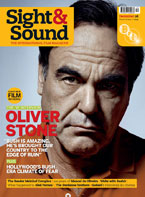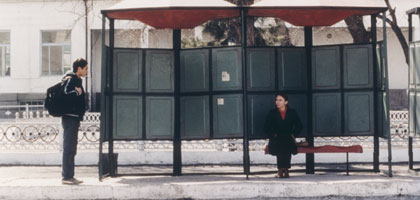
That loving feeling
Film of the Month: To Get to Heaven First You Have to Die

The Tajik director Djamshed Usmonov's latest film, 'To Get to Heaven First You Have to Die', is a darker work than its predecessors but confirms its creator as a bright talent of post-Soviet cinema, says Michael Brooke
Although the film output of many former Soviet republics struggled in the years following the USSR's 1991 collapse, the cinema of Tajikistan was effectively suspended during the 1992-97 civil war, and has struggled to achieve much recognition since, with many film-makers forced to work abroad. However, Djamshed Usmonov has remained true to his roots, in the process becoming arguably his country's most distinctive auteur.
His previous films, The Flightof the Bee (1998, co-directed with the Korean Min Hun) and Angel on the Right (2002) were low-key comedies of manners in whicha schoolteacher and an ex-convict, respectively, tried to achieve harmony with their local communities in general and female relatives in particular. Parts of his third feature To Get to Heaven First You Have to Die suggest a similar tone and narrative trajectory, but it's sparer, bleaker and much more unsettling; more reminiscent of Jerzy Skolimowski's Deep End (1970) and Krzysztof Kieslowski's A Short Film About Love (1988).Like the gauche protagonists of those films, 19-year-old Kamal is a handsome but naïve, somewhat bovine, youth who dreams about the perfect paramour without having any idea about how to find her. Unlike his predecessors, Kamal is married but has been unable to consummate the relationship; we first meet him consulting a doctor about his impotence.
This pre-title scene reveals much about the film's style and preoccupations. Shot in one take, the largely static camera making a single undemonstrative pan to and track through the door of the consulting room, the scene begins with Kamal removing all his clothes and neatly folding them, before lying on a couch to be quizzed by an elderly male doctor. During this examination, Kamal is facing away from the camera - we get a better view of the nub of his penis than we do of his face.
The scene also establishes Kamal's essential harmlessness. Given that he spends the first half of the film stalking four different female strangers, it's useful to know in advance that he poses no threat - and the women, though not privy to this information, regard him with more amusement than alarm. On the train to visit his cousin Said who lives in the city, he receives a polite brush-off from his sleeping-car companion on the grounds that he's too young for her, abandons whatever plans he was hatching when he discovers that the dark-haired woman he follows from the library also teaches tae kwon do, and when he helps a third with her groceries, a glimpse of her husband is enough to make him give up.
Even more tellingly, although Kamal makes no advances towards her, Said's girlfriend adopts a distinctly maternal attitude, draping a blanket over him as he sleeps and watching him for several seconds longer than necessary.She may even be considering seducing him, since Usmonov quickly reveals that Said is lessthan faithful. Although Said is ostensibly doing Kamal a favour by hiring a prostitute for him, he procures one for himself and ends up availing himself of both. (Kamal's excuse for being unable to take up the offer is that they resemble his wife and his mother).
Almost exactly halfway through the film, Kamal finally gets lucky, after re-encountering a woman he first spotted on a bus and followed to a cemetery. Usmonov shows Kamal examining the gravestone after she leaves, but not what he sees; it's only much later that we learn about its occupant. After spending what looks like half the morning waiting for her - the film deftly conveys Kamal's anticipation and boredom, the camera at one point scanning the embarking and disembarking crowds with focus pulls matching those of Kamal's eyes - they finally meet, and she takes the initiative in introducing herself as Vera. This is also the first time we learn Kamal's own name, as though he's been withholding it until he meets someone worthy.
Within minutes of this meet-cute scenario, the film abruptly shifts into a far darker second act. This is due largely to the involvement of Vera's husband, a petty criminal who blackmails Kamal after catching him literally sleeping with his wife (for oncethe phrase is not an euphemism). There's no explicit blackmail, but there hardly needs to be.
The film's second half, andthe previous interlude with Said, suggests that Usmonov's main purpose is to explore notions of masculinity and male attitudes towards women in particular. Said uses prostitutes despite being aware of the drawbacks. Venereal disease, described in un?inching detail, is an occupational hazard (and cured, in the equivalent of a Hitchcock cameo perhaps, by a Dr Usmonov, similarly credited with offscreen medical miracles in Angel on the Right). Said also takes his girlfriend for granted, not bothering to tell her that Kamal is coming to stay with them or that he's going away for three days.
The position of Vera's husband is more complex. His primary reason for committing his various crimes is to get travel documents to allow him and Vera to emigrate to Canada to rebuild their lives after a bereavement, but he also provides several hints of a twisted sexuality. When he first meets Kamal, he asks if he's Vera's husband (does he think, or hope, that she might be a bigamist?). After their first robbery, he orders Kamal to swig vodka and don a red dress - in the film's most tantalising cut Kamal's face in the subsequent shot offers no clue as to what happened. Ultimately he orders Kamal to rape a woman in front of him before taking on the job himself.
The film shifts from the quirky to the actively disturbing, as Kamal can cure his impotence only by being a man in the crudest sense of the term. The film's final scene, in which he returns home to his wife who is never shown but casts a long shadow across the entire film, emphasises a pessimistic view of man's inherently violent nature. On the train, he overhears a woman discussing her pregnancy symptoms - the ferocity of the baby's kicking tells her it's a boy.
Usmonov cast two pivotal roles within his own family. His nephew Khurched Golibekov (Kamal) had no professional acting experience which enhances his character's fish-out-of-water awkwardness. Usmonov's brother Maruf Pulodzoda who plays the part of Vera's husband had already played the lead in his previous film. Russian actress Dinara Droukarova (Vera) was previously seen as the corruptible innocent Liza in Alexei Balabanov's Of Freaks and Men (1998). French cinematographer and editor Pascal Lagriffoul and Jacques Comets, who both worked on Angel on the Right, achieve a precision in framing and cutting that recalls Robert Bresson, with whom Usmonov and Kamal sharea fondness for leaving things discreetly unsaid.
